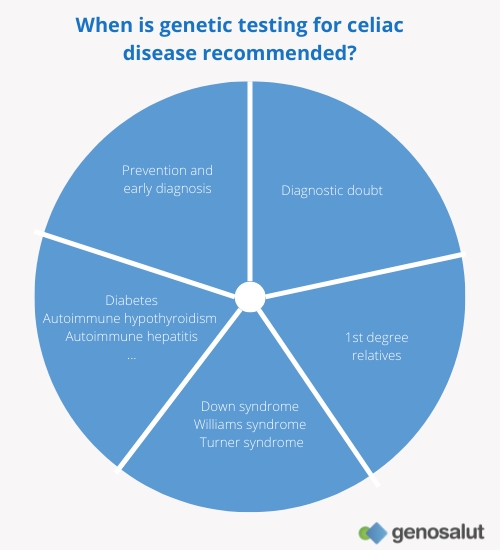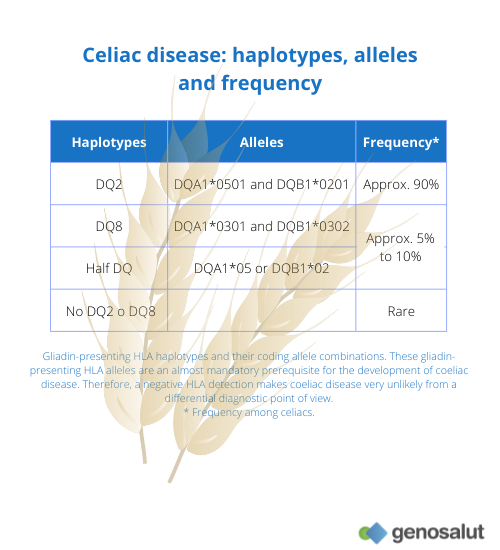Genetic test for celiac disease
Test to analyse allelic variants associated with an increased risk of developing celiac disease.
Price
150€
Time to result
7 working days
What is celiac disease?
Coeliac disease is a malabsorption disorder, caused by interactions between genetic and environmental factors. It is a special case as it is neither an allergy nor a classic intolerance, although it is called as such. It is defined as a chronic, systemic, autoimmune disease caused by the consumption of gluten, which occurs in genetically predisposed individuals.
Coeliacs have an inflamed intestinal mucosa due to the presence of gluten. This immunological intolerance causes a chronic inflammatory response in the mucosa of the small intestine which manifests itself in cases of classical coeliac disease and coeliac disease in children mainly with digestive symptoms including diarrhoea, steatorrhoea and weight loss. However, especially in adolescence and adulthood, extra-digestive symptoms may be more evident, such as: mucocutaneous disorders (psoriasis, dermatitis herpetiformis, eczema, etc.), muscular and joint problems (osteoporosis, fibromyalgia), neurological disorders (migraines, ataxia) and other disorders (anxiety, fertility problems, anaemia, etc.).
Celiac disease test by Genosalut
From a blood sample we extract DNA to analyse the risk haplotypes HLA-DQ2, HLA-DQ8 and half HLA-DQ2. Specifically the DQA1*0501 and DQB1*0201 alleles of the HLA-DQ2 haplotype and the DQA1*0301 and DQB1*0302 alleles of the HLADQ8 haplotype.
Real-time PCR
The test is based on real-time PCR technology with TaqMan probes.
The evaluation of the result is performed according to the recommendations for the preparation of genetic reports on celiac disease of the Working Group on Immunology and Genetics of the Spanish Society of Celiac Disease.
Our value proposal
Experience
At Genosalut, we have more than 10 years of experience in counselling people with conditions where a genetic cause has been identified or is thought to be possible.
Proximity
We are a close laboratory, we respond personally and we take the time to explain the report in detail to doctors and patients.
Professional interpretation of results
Because of our knowledge and experience, we are able to accurately interpret genetic results and offer professional advice.
Reference in the field
We are the point of contact for patients, doctors and clinics in all areas of human genetic diagnostics and prevention.
Who is the celiac disease test aimed at?

The Genosalut genetic test for celiac disease is indicated in the following cases:
- Diagnostic doubt: For people with a clinical suspicion, this test serves to support the diagnosis (in cases with non-digestive symptoms or confusing clinical symptoms) and also to reduce the diagnostic delay.
- Early diagnosis: Although it does not confirm the existence of celiac disease, it does evaluate the predisposition to suffer from it. In case of a positive result, the person will be alerted to his or her risk and can undergo regular testing.
- Family testing: To exclude genetic susceptibility in first-degree relatives of a celiac patient. Immediate family members of a celiac patient are the most important risk group, as they share genes with them. They should therefore have this genetic test to see if they may develop the disease in the future. Sometimes, it can also help to clarify the diagnosis in the case of relatives with extra-digestive symptoms of celiac disease, which had not been considered.
- Risk groups: such as people with Down’s syndrome, people with diabetes, autoimmune hypothyroidism, autoimmune liver diseases, etc.
What role do genetics play in celiac disease?
Celiac disease is a disease determined by a genetic predisposition. In other words, possessing certain variants implies a higher risk of suffering from the disease, but it will ultimately be certain external factors that will determine its onset.
As far as celiac disease is concerned, HLA-DQ2 and HLA-DQ8 are the two haplotypes (a set of genes that are inherited together) that are associated with a greater predisposition to develop it. Almost all coeliac patients (99%) carry one of these two haplotypes.
- In most of the populations studied, 90-95% of patients carry the HLA-DQ2 heterodimer and their risk of developing the disease is 50 times higher than that of the average population. However, its presence does not predict the development of the disease, as it also occurs in a quarter of the general healthy population.
- The remaining patients (5-10%) usually have the DQ8 haplotype or carry one of the DQ2 haplotype alleles (Half DQ2) separately (DQA1*05 or DQB1*02).

How can I request a genetic test for celiac disease?
Request an appointment
Contact us through the form, by e-mail or by telephone to make an appointment with us.
Ask your physician
You can also consult your doctor for information on the possibilities of genetic testing.
We analyse the probe
In our genetic diagnostics laboratory we analyse the sample with the latest technology.
We write a report
We provide a detailed description of the results and, if necessary, genetic counselling.
FAQs
Why is early diagnosis of celiac disease important?
Experts indicate that genetics contributes 75% to the development of celiac disease and the remaining 25% to environmental factors. Therefore, it is important to know the genetic predisposition to celiac disease.
In both children and adults, it will allow planning a closer follow-up to detect the disease early, to rule out cases of subclinical celiac disease and latent celiac disease, where they exist. This is important, as late diagnosis and lack of appropriate measures often leads to other autoimmune disorders, such as dermatitis herpetiformis, type 1 diabetes or rheumatoid arthritis.
Is celiac disease hereditary?
Celiac disease has a genetic component of predisposition, i.e. it is not the disease that is inherited, but the risk of suffering from it. It is therefore NOT a hereditary disease in the strict sense of the word. According to data and studies in recent years, between 10% and 30% of the first-degree relatives of a celiac person also have a genetic predisposition compatible with celiac disease, but this only means that they may develop the disease.
As mentioned above, the haplotypes HLA-DQ2, HLA-DQ8 and half DQ2 are those directly related to celiac disease. However, being a carrier of one of these haplotypes does not necessarily mean that you will develop the disease.
How is the genetic test for celiac disease done?
Genetic testing for celiac disease is simple and painless. It can be performed on a blood or saliva sample. After the sample is taken, the analysis is carried out in the laboratory (for the linked haplotypes HLA-DQ2 and HLA-DQ8) and within a few days the patient has the result.
What results can I get from the genetic test for celiac disease?
The results that can be obtained are as follows:
- Absence of the DQ2 or DQ8 haplotypes. There is no genetic predisposition to suffer from celiac disease.
- Presence of the DQ2 and/or DQ8 haplotypes, in heterozygosis (one copy) or homozygosis (two copies). There is a genetic predisposition to celiac disease and the risk is up to 50 times higher.
- Presence of the half DQ2 haplotype (only one of the HLA-DQA1*05 or HLA-DQB1*02 alleles). There is a genetic predisposition to celiac disease.
What does HLA-DQ2 positive or negative mean?
It is a predisposition test, i.e. it is used to determine the risk.
- Negative predictive value: It is very high, if the result is negative, celiac disease is ruled out with 99% certainty.
- Positive predictive value: There is a higher risk (up to 50 times higher) of developing the disease than in non-carriers of this haplotype. Perhaps the carrier has already developed the disease, perhaps they will do so in the future, or perhaps they will never develop the disease. 30% of the healthy population has genetics compatible with coeliac disease, yet only 1% of the population develops the disease.
What does HLA-DQ2 positive or negative mean?
It is a predisposition test, i.e. it is used to determine the risk.
- Negative predictive value: It is very high, if the result is negative, celiac disease is ruled out with 99% certainty.
- Positive predictive value: There is a higher risk (up to 50 times higher) of developing the disease than in non-carriers of this haplotype. Perhaps the carrier has already developed the disease, perhaps they will do so in the future, or perhaps they will never develop the disease. 30% of the healthy population has genetics compatible with coeliac disease, yet only 1% of the population develops the disease.
What is the cost of genetic testing for celiac disease?
The Genosalut genetic test for celiac disease costs 150€.
How long does it take to get the results of the genetic test for celiac disease?
The results of the genetic test take 7 days.
Does private insurance cover genetic testing for celiac disease?
In certain circumstances, private insurance companies cover the costs of this genetic test.
Request an appointment with us
Opening hours
Monday to Friday from 9.00 am to 1.00 pm
+34 616 59 01 65
info@genosalut.com
Camí dels Reis, 308 (Clínica Palma Planas)
Contact form
Reasons for trusting Genosalut
First genetic diagnosis laboratory in the Balearic Islands
Professionals with experience in medical genetics
Detailed report of the results
Personalised attention for each patient
Wide range of genetic tests
Cutting-edge technology
